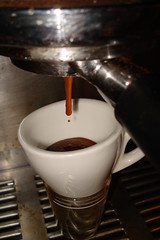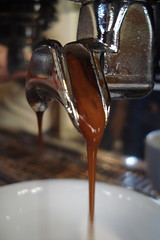A friend and I were recently talking about our mutual and somewhat surprising inability to develop sophisticated palates for wine, even though we might be highly sensitive to the nuanced flavors of, well, in my case, coffee.
Which got me to wonderin' about the language we use to describe the essences of certain things, and how -- useful as they may be when discussing a Yirgacheffe with a barista buddy -- we must sound a little ridiculous when using them with the kind of average joe who orders a "regular."
This morning, for instance, one of my favorite customers asked me about a Colombian we are currently featuring. The description posted in the store mentions a "complex acidity," and he said, "'Acidity,' that's like bitterness, right?" To which I responded, "Well no, it's more like a kind of pleasant tartness."
And then I thought, well why the heck don't we just say "complex but pleasant tartness" then? This guy didn't care from "acidity," he just wanted to know what it would actually taste like. Giving him an answer in a language made totally oblique by years of experience and a barista's sophisticated coffee knowledge doesn't help him, so what's the point? It's a bit like asking the guy behind the counter at Two Boots to describe the essence of the pepperoni slice and having him respond, "Well, it's a full-bodied pizza with a rustic, smoky finish and bold red berry notes."
Which, I guess, would be pretty awesome, but what the heck does that mean? Is it salty? Does it go better with Coke or Diet Coke? I mean really. And that's always how I feel when I pore over a wine list -- "What the heck does 'rustic' mean anyway? Do I want to drink it?"
I'm showing my Dunkin' Donuts-loving Jersey roots here, and I don't mean to invalidate the very graceful and insightful lexicon developed by generations of baristi -- it's just that, you know, I think maybe sometimes we should call a spade a spade.
I'm just sayin'.
4/7/06
Who you callin' tart?
Posted by
Meister
at
5:57 PM
![]()

